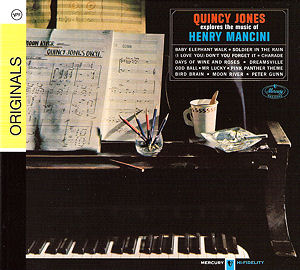1. Baby Elephant Walk
2. Charade
3. Dreamsville
4. Bird Brain
5. Days of Wine and Roses
6. Mr. Lucky
7. The Pink Panther
8. (I Love You) And Don't You Forget It
9. Soldier In The Rain
10. Odd Ball
11. Moon River
12. Peter Gunn
Collective personnel
Jerome Richardson, Roland Kirk, Stan Webb, Zoot Sims, Phil Woods,
Walter Kane, Seldon Powell, Romeo Panque, George Berg - Reeds
Richard Hixson, Urbie Green, Billy Byers, Quentin Jackson, Tony Studd
- Trombones
Clark Terry, Ernie Royal, Snooky Young, Jimmy Maxwell, John Bello
- Trumpets
Harvey Phillips - Tuba
Jimmy Buffington, Tony Miranda, Bob Northern, Ray Alonge - French
horns
Margaret Ross - Harp
Gary Burton - Vibes
Bobby Scott - Piano
Mundell Lowe, Vincent Bell - Guitar
Toots Thielemans - Guitar, harmonica, whistle
Milt Hinton, Major Holley - Bass
Osie Johnson - Drums
Martin Grupp, Philip Kraus - Percussion
Quincy Jones is a man of so many talents that it is difficult to
remember them all - let alone to list them. Starting off his career
as a trumpeter with Lionel Hampton's band in the early 1950s, he began
writing arrangements for lots of different bands. His arranging led
to producing and conducting and being chosen as the A & R man
for various record companies. He also became a prolific composer of
film music, as well as producing albums for everyone from Ray Charles
to Aretha Franklin (and, of course, Michael Jackson, which made Quincy
very much in demand).
Having started out as a jazz trumpeter, much of his work retains
a jazz feeling, and this is particularly notable in his big-band recordings
of the fifties and sixties. They are no routine big-band sessions,
as Quincy had an individual style which set his arrangements apart
from the crowd. What is especially noticeable on this 1964 album is
his liking for unusual sounds - like the humming double bass of Major
Holley, the honky-tonk piano effects created by Bobby Scott, and the
whistling of Toots Thielemans. Things like these give this album a
special quality which was also present in Quincy's score for the film
In the Heat of the Night, where he used such unique instrumental
sounds as those made by Roland Kirk, who is also present on this album.
The twelve tracks were recorded at three different sessions with
three different bands, although using many of the same musicians.
Baby Elephant Walk opens with a fuzzy electric guitar and retains
Henry Mancini's portrayal of elephants stomping along. There is also
a bowed double-bass passage and the track closes with Bobby Scott's
down-home piano. Charade hurries along like the theme from
a spy movie, but parts of the arrangement sound like vintage Count
Basie, and Roland Kirk adds some typically outlandish sounds towards
the end.
The mood quietens down for a richly-scored version of Dreamsville,
which has the warmth of the arrangement of For You which Thad
Jones (no relation) wrote for Count Basie. Bird Brain is typical
1960s, with twittering flutes and a groovy alto-sax solo (probably
by Phil Woods) but it still has those unique touches which signal
a Quincy Jones concept (e.g. Thielemans swapping whistling fours with
Major Holley's bass).
French horns and tuba add depth to the poignant Days of Wine and
Roses (after all, the theme from a film about alcoholism) with
added punch from Roland Kirk on tenor sax. Mr Lucky is appropriately
easy-going, with the sort of perfect tempo I remember from Quincy's
album Golden Boy (an LP that really deserves a CD reissue).
The Pink Panther retains the tongue-in-cheek mood of Mancini's
original theme, with Major Holley growling like a panther, drummer
Osie Johnson slapping his knees and Quincy Jones clicking his fingers.
(I Love You) And Don't You Forget It is taken as a fast, gutsy
bossa nova that nobody will forget, while Soldier in the Rain
has the requisite sadness expressed by Toots Thielemans' yearning
harmonica and lonely whistling. Odd Ball sounds like a big
band even though there are only a dozen musicians playing. Thielemans
again whistles along with his guitar.
Quincy Jones gives Moon River a complete make-over. It is
usually performed as a slow, sensual ballad but he turns it into a
fastish jazz-waltz with unusual voicings for added piquancy. The album
ends with Peter Gunn, with the right sort of slow-burning menace
and a capricious flute solo which must be the one-and-only Roland
Kirk.
The only fault with this reissue is that reducing the sleeve note
to CD format renders the personnel details visible only to someone
who is used to reading the Bible on the head of a pin. Yet I am willing
to forgive even this shortcoming, as the album makes such brilliant
listening that I can't be bothered to read while it is playing.
Tony Augarde
